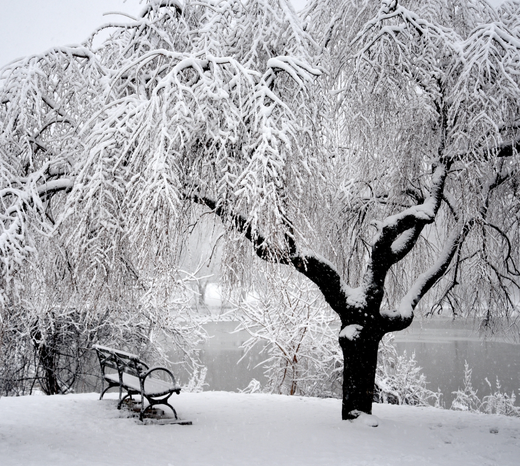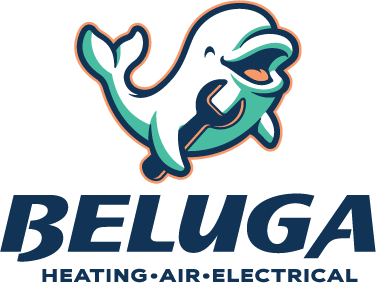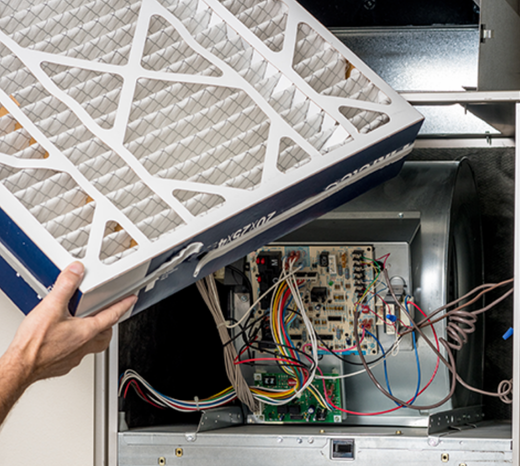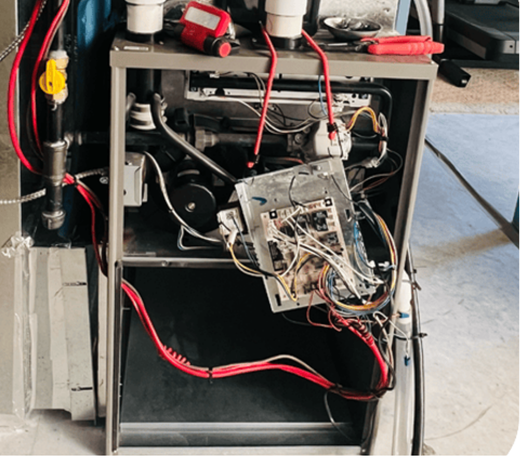Learn why your furnace is blowing cold air in the newest blog from the experts at Beluga Heating, Air & Electrical.
…

As winter temperatures plummet in Upstate New York, the last thing you want is your furnace blowing cold air when it should be keeping your home cozy.
If you’re experiencing an unexpected chill coming from your vents, it’s not just uncomfortable – it could be pointing towards bigger issues within your heating system.
From thermostats to faulty components, there are a number of reasons why your furnace might be misbehaving. In this blog, the heating experts at Beluga Heating, Air & Electrical will walk you through the most frequent culprits behind cold air and let you know when it’s time to call in the pros.
Let’s get that heat back on track!

Thermostat Settings
An often overlooked piece of the cold air puzzle is the thermostat. It’s the central hub of your entire system, yet it’s not usually the first place our mind goes when there’s an issue with our heat.
Start by checking the thermostat, and ensuring it’s set to “heat” and not “cool” or “fan.” Also ensure that your room temperature is set to your preferences, so the thermostat knows when to kick the furnace off and on.
If you’ve checked the settings, and you’re still getting cool air, it could be an issue with the electrical wiring, or something deeper in your system.
Overheating Furnace
Your furnace may begin to blow cold air when the safety mechanisms in place shut it down due to overheating.
Overheating can happen when the individual components within your furnace have to work too hard to effectively heat your home. For example, issues such as clogged air filters can cause restricted air flow, causing the components inside to heat up every time your furnace turns on. Overheating leads to more frequent repairs and eventually a full system breakdown if left unchecked.
The best solution is to regularly check and clean your furnace filters every 60-90 days, and schedule regular maintenance.
At Beluga Heating, Air & Electrical we take the stress out of annual maintenance with our comprehensive maintenance contracts. We’re proud to help our community warm and comfortable with discounted HVAC service, seasonal tune-up reminders, parts & labor warranties, and price protection! Contact our friendly team today for more information.

Pilot Light Issues
If your current furnace is nearing the end of its lifespan, one reason it could be giving you the cold shoulder is its pilot light.
The pilot light is responsible for igniting the burners that produce heat, and if it goes out, your furnace won’t be able to generate heat.
This can happen if your basement or mechanical room has a draft, or if you have a faulty thermocouple.
If you feel comfortable, you can relight your pilot light yourself quite easily, but if the problem persists, it’s best to call in our experts. We’re trained to quickly identify and address a wide range of pilot light issues and get your furnace back up and running, fast.
Faulty Or Dirty Flame Sensor
What’s a flame sensor? You might be asking.
Well, this small but crucial component is how your furnace monitors the burner flame. When it malfunctions or if it gets dirty, it will automatically shut down your furnace if it doesn’t detect a flame. This is a key safety feature that helps prevent gas leaks and other safety hazards.
When you call in our experts for regular maintenance, we always ensure to thoroughly inspect and clean all internal components, including the flame sensor, to help prevent heating issues.
Leaky Ductwork
Even the newest, most powerful and most efficient furnaces are no match for leaky or clogged ducts!
To help your furnace out, conduct a visual inspection of your ducts and remove any clogs due to dust and debris build up. Once they’re free and clear, carefully examine your ducts for any signs of damage such as holes or loose seams.
You can easily reseal using mastic sealant or metal foil tape, sorry DIYers, duct tape won’t cut it here. For larger gaps, you may require sheet metal in addition to your patches or sealant.
Once any leaks are patched up, double check your insulation for any thin spots. Or you can upgrade your insulation to something with a higher R value for maximum efficiency.

Insufficient Gas Supply
Another reason your furnace may be blowing cold air is its gas supply. Furnaces need a consistent supply of gas to ignite the burners and produce heat.
If there’s a problem with the gas supply, such as low pressure or an interruption in service, your furnace may not function properly. Additionally, a malfunctioning gas valve can prevent gas from even reaching the burners, forcing your furnace into blowing only cold air.
It’s important to always check with your local utility company to see if there’s an outage or service issue, or that it’s safe to embark on repairs. Once they’ve given you the all clear, give our experienced technicians a call to inspect the valve and other components.
Blower Motor Issues
If you’re experiencing weird noises such as banging or grinding every time your furnace comes on, you might have a blower motor issue. A faulty blower motor can cause your furnace to overheat, or prevent it from distributing heated air evenly throughout your home.
Blower motor issues are one of the most common causes of furnace repair and replacement, so don’t hesitate to call us at the first sign of malfunction!
Incorrect Sizing
One of the most important factors to consider when installing a new furnace is that it’s sized correctly, but how do you know if it’s wrong if it’s an existing or older unit?
Well, a furnace that’s undersized will struggle to effectively heat your home. It will have to work harder and longer to achieve the same results as a properly sized model, resulting in increased wear and tear, and premature replacements.
On the flip side, if your furnace is too large for the space. It will cycle on and off repeatedly, preventing temperature consistency, also leading to early component failure.
But you don’t have to worry when you have Beluga Heating, Air & Electrical on your side. We’re Putnam County’s preferred choice when it comes to furnace replacements and installation. Every installation begins with an evaluation where one of our trained technicians will take comprehensive measurements of the square footage of your home, the number and locations of windows and doors, and the condition of your ducts and insulation in order to determine the best equipment options for your unique needs.
We carry furnace options from all the most trusted brands, and come to you in fully stocked service trucks ready to give you the most efficient and professional installation service available. Call us today!
When those New York winters hit, you don’t want to be stuck with a furnace blowing cold air. Armed with this blog, a little troubleshooting, and some help from the pros you can get your home back to warm and cozy before you know it!
When your heating system fails you need a company you can trust, so call on the experts at Beluga Heating, Air & Electrical. We’ve been Putnam County’s #1 choice for furnace installation, maintenance and repair for over 20 years. We’re here to help!

Frequently Asked Questions
How much does heating repair cost?
The cost to repair your heating system depends on the type, size and condition of the equipment you have in your home. Call our experts today for your no-obligation evaluation and quote!
How long does heating repair take?
Most heating issues can be repaired in 1-2 hours, depending on the severity. If your equipment will require a longer service call, we’ll explicitly outline the scope of work during your evaluation so there are no surprises.
When do I need to repair my heating system?
Most heating systems, whether they be furnaces, boilers or a heat pump will last about 15 years with proper care and maintenance. Common heating system issues include: inconsistent heating, weird noises and rising utility bills. If you’re experiencing any of these issues, call our team today to schedule your comprehensive repair service.



